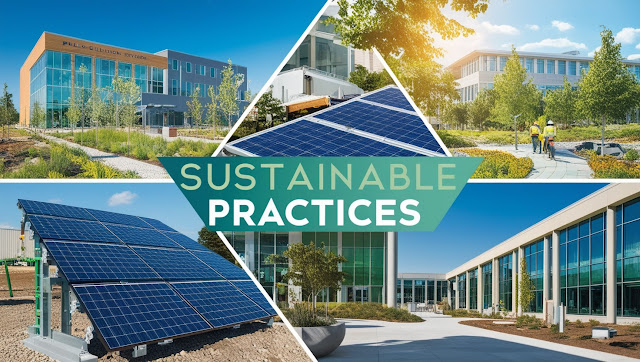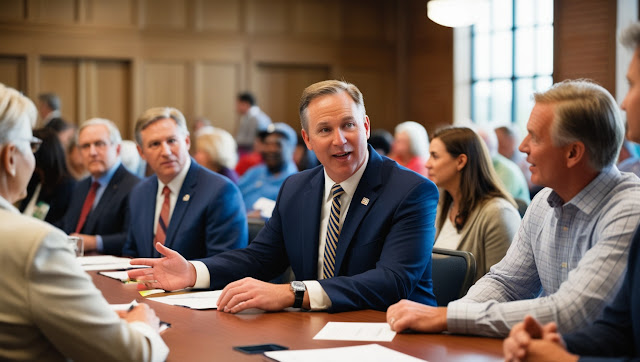Executive compensation ranging from $550,000 to $700,000 is the norm in today's dynamic public works sector. This change is a direct result of the increased difficulty of undertaking new infrastructure projects and the consequent demand for seasoned executives capable of overcoming obstacles and implementing creative solutions. The importance of good leadership in public works can be better understood if one is familiar with the variables that led to such high compensation.
The Changing Landscape of Public Works Leadership
The Importance of Public Works in Society
Transportation,
utilities, water management, and urban development are all part of public
works, which comprise a wide range of important services. Communities rely on
these services to keep their quality of life high and to help their economy
flourish. The demands on public works systems are rising in tandem with
urbanization and population growth, making competent leadership more important
than ever.
Evolving Challenges in Public Works
·
Among
the many difficulties that public works officials have encountered in the past
few years are:
• Infrastructure that is getting on in years: A lot of the current
infrastructure is old and needs fixing or replacing, which calls for creative
solutions and a lot of money.
• Sustainability: Leaders are needed who can incorporate ecologically conscious
practices and sustainable development ideas into public works initiatives, as
these concepts are gaining prominence.
The leaders of public works agencies must keep up with the latest technical
developments in order to take advantage of the many new tools and techniques
that are constantly appearing on the market.
The Role of Public Works Executives
Strategic Leadership
The leaders in the
public sector are accountable for establishing the long-term goals and
strategies of their respective organization's. In order to meet the demands of
the community and stay in accordance with regulations, they need to create and
carry out strategic plans.
Financial Management
Properly distributing
resources, managing budgets, and obtaining money are all important components
of an executive's job. There is a significant need for seasoned executives who
can guarantee financial responsibility and transparency due to the complexity
of large-scale projects' finances.
Stakeholder Engagement
Powerful public works
executives collaborate with a wide range of constituents, including public and
private organizations. Involvement like this is vital for gaining confidence
and making sure initiatives live up to public expectations.
Factors Contributing to High Salaries
Knowledge and Skill
Public works executives earn a lot of money since they need a lot of expertise.
Executives that have strong educational and professional backgrounds in
engineering, public administration, or urban planning are able to successfully
manage complicated projects and earn better salaries as a result.
Where It Is Located
Pay chequeens could range greatly from one area to another due to variations in
living expenses. To compete for the best and brightest, public works projects
in cities typically pay more.
Business Aspects and Scale
Salary increases for executives who can effectively manage large teams and
budgets are common in larger companies or those working on complex projects.
The demand for experienced leaders is increasing, leading to higher wages, as
public works agencies take on more complex and expansive projects.
Current Trends in the Industry
There is a lot of competition for competent leaders due to the public works
sector's growing interest in sustainability and technology. Executive
compensation is impacted by the growing importance of creative and flexible
leaders in an ever-changing market.
The Value of
Experienced Leadership
Enhancing Project Outcomes
·
Project
results can be greatly enhanced with the help of seasoned public works
executives. What follows from their expertise and understanding is:
Lower Expenses: Seasoned leaders can find ways to save money by utilizing
their knowledge of project management to find the best use of resources.
Executives with experience are great at controlling schedules and can
anticipate any delays, so they can solve problems before they even happen,
ensuring on-time delivery.
Maintaining high standards of quality and making sure public works projects
meet or beyond community expectations are two aspects of quality assurance that
are more likely to be addressed by a leader with extensive expertise.
Driving Innovation
Innovative solutions
that improve service delivery are more likely to be implemented by public works
executives with a solid expertise in technology. They can enhance efficiency
and better meet the demands of the community by using innovative tools and
approaches.
Navigating Challenges in Public Works
Allocation of Funds and Resources
It is not easy to get sufficient funds for public works projects. In order to
entice investments from both the public and private sectors, executives need to
create persuasive proposals and successfully negotiate complicated funding
landscapes.
Meeting All Required Standards
Executives in the public works sector have a responsibility to keep abreast of
new rules and regulations. To successfully perform a project and reduce risks,
it is vital to understand legal requirements.
Involvement of the Community and Opposition
Members of the community frequently oppose the implementation of public works
projects. To guarantee project acceptability and success, leaders need to
interact with the public, resolve issues, and cultivate trust.
Frequently Asked Questions (FAQs)
What qualifications do public works executives typically have?
Degrees in public
administration, urban planning, or advanced engineering are common among public
works executives. In addition to a strong background in project management,
substantial leadership experience is required.
How does experience influence salary in this field?
Salary is heavily
influenced by years of experience. Executives who have successfully overseen massive
public works projects in the past are in a better position to negotiate a
higher salary based on their expertise, knowledge, and track record of success.
Are there opportunities for growth in public works executive roles?
The executive
positions in public works do, in fact, provide ample room for advancement. Government
agencies, larger municipalities, or consulting engagements offer leaders the
opportunity to ascend to higher-level positions, which can enhance their impact
and income.
How can new leaders enter the public works field?
Acquiring the
necessary education, interning, and networking with established experts in the
field can pave the way for future leaders to join the public works sector.
Working one's way up from entry-level jobs can also teach one a lot about the
ins and outs of public works.
What are the future trends in public works leadership?
Sustainability,
digital transformation, and the integration of intelligent technologies into
public infrastructure systems are some of the upcoming themes in public works
leadership. In order to stay relevant, leaders need to adjust to these changes
as the sector develops.
Conclusion
The growing complexity and societal
significance of infrastructure projects are reflected in the salary trend of
public works executives earning between $550,000 and $700,000. Leaders play an
increasingly important role as they face difficulties and put new solutions
into action. Aspiring leaders and stakeholders can gain useful insights by
understanding this scenario.
Skilled leaders who can propel reform and adjust to shifting needs will be in high demand as the public works industry undergoes further evolution. Important services can be maintained in an efficient, sustainable, and community-responsive manner if the industry is able to recruit and retain excellent staff.









0 Comments